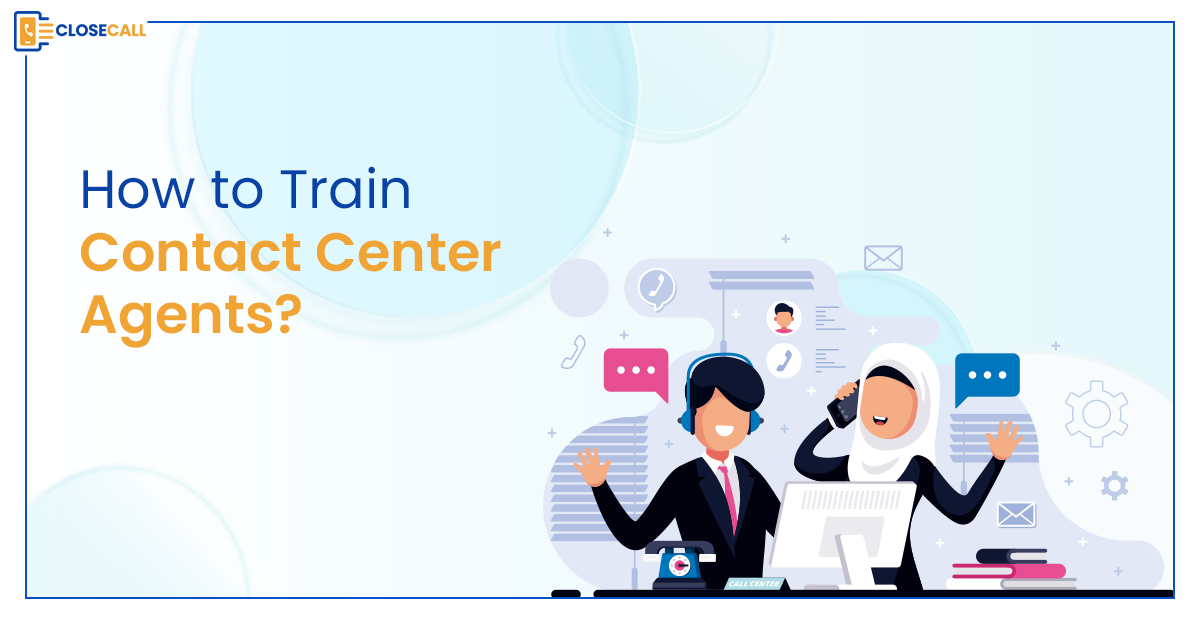We all know that customers’ expectations for services are continuously growing. It has become very crucial for any business to meet their expectations. Contact center agent training is a vital part of the puzzle. So, you have to improve performance management and training best practices in the call center to keep your customers happy and fulfil their requirements. It is your responsibility to make sure that everyone who talks to your customers on the phone is well-trained and has the quality to convince them.
It is also true that contact center directors may face lots of challenges as they establish and implement call center training programs for contact center agents, including resources, budget, time, and training expertise. Now, a new challenge is also hitting the market, which is training contact center agents remotely. Hope you understand the scenario. If you belong to the same industry, this post is suitable for you. Here, we are going to highlight the tips that will help you know how to train contact center agents.
Read it out carefully:
All about Contact Center Agents
Contact center agents are a group of representatives that deal with all incoming and outgoing consumer correspondence through social media, live chat, email, and other methods. You depend on support centers large and small to resolve problems and offer assistance, whether you’re calling to rebook an airline ticket, find out about a credit card charge, or investigate the cause of your new laptop’s Wi-Fi connectivity issues.
Contact centers combine people, procedures, and technology to provide effective customer service across a variety of channels. By leveraging comprehensive data and enterprise-wide insight, they generate superior encounters that stimulate growth in both client base and revenue.
Numerous corporate operations are supported by contact center technology. These could be “call centers,” where employees (often referred to as agents) only take calls. Alternatively, they may function as multichannel contact centers, where representatives manage transactions across digital channels like phone calls, social media, and email.
Contact centers vs. Call centers
Inbound voice calls with a large volume are the primary emphasis of call centers.
On the other hand, contact centers tackle client contacts in a far more comprehensive, multichannel manner. They provide smooth integration with the various channels that consumers currently prefer to utilize, such as social media, web chats, email, texting, and phone calls.
Compared to call centers, contact centers provide a far more consistent and individualized client experience. We hope this section has clarified the differences between the two terms for you so you won’t be confused. Many of the call center agents and contact center agents use call monitoring software.
What is Contact Center Agents Training?
By giving your agents the training, they need, you can help them reach their maximum potential and give your consumers the experience they deserve. Effective training increases employee productivity and improves contact center agents’ performance. Additionally, it’s how you bridge knowledge gaps and assist your contact center agents in gaining the hard and soft skills necessary to perform their duties.
The one-time onboarding that teaches your contact center agents how to answer phones, utilize your customer service system, and enter customer information is not nearly enough for their training. It’s an ongoing process that aims to increase agent performance and overall customer happiness by teaching your staff a variety of topics, including compliance, product or service details, answering difficult inquiries, resolving customer issues, and soft skills.
The secret is to design an effective training program that is led and relevant. To change problematic behaviour, spot unfavourable trends, and uncover core difficulties and learning gaps, it must enable your agents to take ownership of their professional development.
The good news is that superior training is what your staff members desire.
Why is Contact Center Agent Training Important?
According to the study, 74% of employees believe that they haven’t been able to realize their full potential at work since there aren’t enough growth opportunities. You may more effectively draw in and keep top talent while making sure that your contact center agents are constantly improving their abilities and staying involved in the job by creating a strong call center training program.
It is impossible to exaggerate the significance of call center training in terms of client satisfaction. It is necessary to deliver a remarkable client experience. It’s about how you train your agents to do things quickly and effectively:
• Answer customer questions,
• Show compassion and awareness of issues.
• Return calls, emails, and chat messages.
• Create an extensive data and knowledge base;
• Ensure that every interaction meets the expectations of the consumer.
You need to provide customer service training and development if you want your contact center agents to reach their maximum potential. You can’t expect to provide excellent customer service in every interaction, and you won’t be able to sufficiently support growth, retention, and productivity without training.
Tips to Train Contact Center Agents
Agent empowerment is essential for improving the client experience. They must be trained in both technical and soft skills, as well as in peer coaching and team relationship building. They facilitate the hands-on experience, offer chances to become product specialists and encourage self-reflection on performance. They also never quit their training. Training programs for contact center agents that are successful constantly build new skills and strengthen those that already exist.
Develop Goals and Objectives
An organization must guarantee that its goals and objectives are in line with the business strategy for its contact center agents’ training program to be successful. Crafting learning goals into contact center agent training requires a business to strategically create and record its vision, purpose, goals, objectives, culture, and brand goals.
Bring Top-performing Contact Center Agents to Training
Setting an example for a new contact center agent is one of the best ways to train them. Here’s where some of your training needs can be met by your top-performing contact center agents. They consistently deliver excellent customer service as competent agents, and a new call center hire can benefit greatly from their knowledge.
This kind of training program can be put into practice by having your new hire work alongside your best agents. Your new agent will be able to observe firsthand how call center professionals manage various customer concerns by listening in on live client calls. Additionally, they will witness firsthand how the seasoned representative enhances customer service and efficiency by utilizing call center tools and software.
This type of training program will raise the standard for new hires, increase employee engagement, and deepen their understanding of how to do their jobs well.
Teach Proper Call Center Etiquette
After several years of employment in the same field, some aspects of the job become second nature. Furthermore, as managers, we sometimes overlook that not everyone possesses naturally occurring abilities like a polite phone conversation. The good news is that all trainees at a contact center can learn soft skills. It is where a well-thought-out training program—one that is based on sound training materials—comes into play.
Never undervalue the significance of contact center agent training on how to handle consumers politely and respectfully over the phone. Little details can make a major difference in the customer support experience for call center agents. For example:
Communicating Wait Times
Make sure your agents understand the significance of discussing projected wait times if they have to put a consumer on hold. Customers may become impatient and agitated or even hang up if they don’t know when the person will return.
Letting Customers Know that the Call may be Recorded for Training Purposes
Although most customers don’t mind the recording, they would rather know that it is happening.
Call Recording Paused while Credit Card Information was being Collected
The majority of agents regularly take this precautionary measure. Customers will feel more at ease and trust you if you disclose to them how you protect their data.
You can equip your agents with the necessary skills to ensure that every customer feels appreciated, respected, and secure by providing them with training on correct call center etiquette. And on that foundation, excellent customer service is based.
Build a Training Software Stack
The collection of resources used to guide agents through your training program is called a training software stack. It is important for remote teams because it makes it possible for the company to swiftly and consistently train its agents. Even in a remote setting, continuous monitoring is made possible by these instruments.
Your workforce can be trained more quickly and effectively with the following five categories of call center training tools:
- Onboarding tools provide possibilities for performance evaluation, simulated real-world events, and personalized learning programs.
- Knowledge management tools store all of your e-learning and help materials and provide easy, round-the-clock access to them.
- Collaboration tools facilitate communication and knowledge sharing between rookie agents and their peers.
- Artificial intelligence (AI)-based guidance tools: make every call an educational experience by using voice cues to determine the emotions of the customer and the agent and suggest appropriate responses.
- With the use of whisper coaching tools, peers and team leads can mentor agents during client calls without the clients’ knowledge.
Plan Everything from the Call Center Floor to Onboarding
Within the allotted period, a newly hired employee needs to be able to finish the training and make it to the call center floor.
Any hold-up in the procedure would not only result in significant expenses for the company but also lower agent morale.
How can Supervisors and Managers Reduce these Delays?
Here are a few pointers:
For Every Module, Establish Specific Goals and Objectives
All of the training should be planned and scheduled ahead of time, with reasonable deadlines.
Set aside the resources that are required in advance for every training phase. Assigning mentors, choosing case studies, curating call scripts, and so on are some examples.
Make the most of the onboarding period by providing basic training on the company’s tools and procedures. To help the new hires gain a feel for the work, show them around the call center floor.
Establish Procedures for Quicker Assessment and Commenting
The agents will be able to see how they go from being trainees to being stars on the floor by creating a training plan.
It will also assist the manager or trainer in determining each recruit’s capacity for learning and developing a more specialized training program. Some people learn quickly and can go straight to the certification process, while others can receive targeted coaching to strengthen their areas of weakness.
Make Training Interactive
There’s a good chance your training course is a complete bore. Actually, according to 58% of businesses, the main focus of their onboarding program is paperwork and procedures. Does anyone else experience a heavy lid? Providing new hires with a stack of papers and a few training videos to peruse won’t be enough to keep them interested in your onboarding materials and ensure they retain them. Instead, you need to develop an interactive training program.
Bringing in speakers from different departments is a terrific way to get trainees interested. It gives trainees the chance to get to know more team members and ask questions about how their position at the contact center relates to the larger goals of the business. Senior management could provide an overview of the business, HR could inform agents of the resources at their disposal, the customer experience team could discuss how the contact center contributes to their goals, and so on.
To aid in the socialization of new contact center agents, you can also plan a company lunch, happy hour, or outing. Building relationships with your team members is just as crucial as learning about procedures; when your agents trust one another, the entire team will perform better. Additionally, it raises spirits and fosters camaraderie, strengthening the atmosphere at work.
Teach Technical Skills Using Demonstration
If an expert does the same, agents will find it much easier to learn new tools and equipment.
An experienced worker can finish a task or demonstrate to agents how to use the tool. To grasp what they have learned, you can ask an agent to go through the steps again.
A wonderful technique to educate new software or error-prone procedures is through a demonstration.
Live Call Training
Without a doubt, the most crucial kind of training you’ll undertake in your call center is live call training. This is where you’ll observe how your agents manage calls under pressure and put any theoretical knowledge into practice.
Incorporate live call training into your agent orientation, first onboarding program, and any continuing training sessions. It should always be the goal of agents (as well as management) to refine and enhance their phone manners.
Multichannel Support Training
Contact center agents must have proper knowledge of different channels like phone, email, chat, and social media. For better customer connections, agents must be proficient across all these platforms. The structure of a multichannel contact center agent training program prepares agents to provide consistently high-quality customer support regardless of the channel of communication.
Train Online
We all know that online media is grabbing the attention of every business. One of the simplest ways to improve the effectiveness and convenience of customer service training is to move it online. Face-to-face training is time-consuming. You have to get contact center agents together (some of them are always late), set up the equipment to play a video or make a presentation (some equipment is nearly always broken), go over the material while staff members are preoccupied with work, and so on. Additionally, call centers typically have a high turnover rate, which means that new staff must go through the same training sessions repeatedly.
What are the Benefits of Contact Center Agent Training?
The advantages of contact center agent learning and development and agent training are extensive, impacting nearly every facet of your company and workforce. Let’s examine how you may make the most of it to reach your greatest potential and promote growth, retention, and productivity.
- Better Representation of the Brand: A skilled representative acts as the face and spokesperson for your company, presenting it in the best possible light. They are more qualified to embody the ethics and ideals of the business in every encounter.
- Making Well-Informed Decisions: Agents who receive contact center agent training are better able to make decisions. Equipped with the appropriate knowledge and abilities, they may act quickly, effectively, and sensibly, making judgments that benefit the company.
- Adaptability to Change: Agents who receive regular training are better equipped to adjust to changes in business policy, procedures, or technology. This flexibility guarantees seamless changes and continuous customer service.
- Enhanced Sales Conversion: Agents can be better prepared to upsell and cross-sell by enrolling in contact center agent training programs. This raises sales conversion rates while simultaneously improving customer service.
- Risk management: Thorough training reduces risks, particularly in areas like data security and legal compliance. It guarantees that representatives understand the procedures for managing confidential client information and adhering to industry rules.
Conclusion
Nowadays, every business is moving towards a customer-centric approach. And thus, it becomes their priority to assemble a knowledgeable and driven group of customer representatives. These above-mentioned tips can prove a modern approach to traditional contact center agent training.
Including these tactics in your training program for contact centre agents will undoubtedly assist you in creating a customer engagement workforce that is prepared for the future.



